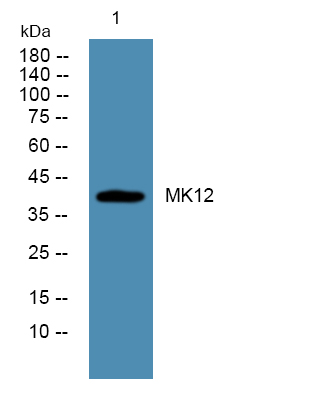MK12 Polyclonal Antibody
- Catalog No.:YN1614
- Applications:WB;ELISA
- Reactivity:Human;Mouse;Rat
- Target:
- MK12
- Fields:
- >>Endocrine resistance;>>MAPK signaling pathway;>>Rap1 signaling pathway;>>FoxO signaling pathway;>>Sphingolipid signaling pathway;>>Oocyte meiosis;>>Cellular senescence;>>Adrenergic signaling in cardiomyocytes;>>VEGF signaling pathway;>>Osteoclast differentiation;>>Signaling pathways regulating pluripotency of stem cells;>>Platelet activation;>>Neutrophil extracellular trap formation;>>Toll-like receptor signaling pathway;>>NOD-like receptor signaling pathway;>>RIG-I-like receptor signaling pathway;>>C-type lectin receptor signaling pathway;>>IL-17 signaling pathway;>>Th1 and Th2 cell differentiation;>>Th17 cell differentiation;>>T cell receptor signaling pathway;>>Fc epsilon RI signaling pathway;>>TNF signaling pathway;>>Leukocyte transendothelial migration;>>Thermogenesis;>>Neurotrophin signaling pathway;>>Retrograde endocannabinoid signaling;>>Dopaminergic synapse;>>Inflammatory mediator regulation of TRP channels;>>GnRH signaling pathway;>>Progesterone-mediated oocyte maturation;>
- Gene Name:
- MAPK12 ERK6 SAPK3
- Protein Name:
- Mitogen-activated protein kinase 12 (MAP kinase 12) (MAPK 12) (EC 2.7.11.24) (Extracellular signal-regulated kinase 6) (ERK-6) (Mitogen-activated protein kinase p38 gamma) (MAP kinase p38 gamma) (Stre
- Human Gene Id:
- 6300
- Human Swiss Prot No:
- P53778
- Mouse Swiss Prot No:
- O08911
- Rat Swiss Prot No:
- Q63538
- Immunogen:
- Synthesized peptide derived from human protein . at AA range: 70-150
- Specificity:
- MK12 Polyclonal Antibody detects endogenous levels of protein.
- Formulation:
- Liquid in PBS containing 50% glycerol, and 0.02% sodium azide.
- Source:
- Polyclonal, Rabbit,IgG
- Dilution:
- WB 1:500-2000 ELISA 1:5000-20000
- Purification:
- The antibody was affinity-purified from rabbit antiserum by affinity-chromatography using epitope-specific immunogen.
- Concentration:
- 1 mg/ml
- Storage Stability:
- -15°C to -25°C/1 year(Do not lower than -25°C)
- Observed Band(KD):
- 40kD
- Background:
- Activation of members of the mitogen-activated protein kinase family is a major mechanism for transduction of extracellular signals. Stress-activated protein kinases are one subclass of MAP kinases. The protein encoded by this gene functions as a signal transducer during differentiation of myoblasts to myotubes. [provided by RefSeq, Jul 2008],
- Function:
- catalytic activity:ATP + a protein = ADP + a phosphoprotein.,cofactor:Binds 2 magnesium ions.,domain:The TXY motif contains the threonine and tyrosine residues whose phosphorylation activates the MAP kinases.,enzyme regulation:Activated by phosphorylation on threonine and tyrosine.,function:Responds to activation by environmental stress and pro-inflammatory cytokines by phosphorylating downstream targets. Plays a role in myoblast differentiation and also in the down-regulation of cyclin D1 in response to hypoxia in adrenal cells suggesting MAPK12 may inhibit cell proliferation while promoting differentiation.,PTM:Dually phosphorylated on Thr-183 and Tyr-185, which activates the enzyme.,similarity:Belongs to the protein kinase superfamily. CMGC Ser/Thr protein kinase family. MAP kinase subfamily.,similarity:Contains 1 protein kinase domain.,subcellular location:Mitochondrial when associat
- Subcellular Location:
- Cytoplasm. Nucleus. Mitochondrion. Mitochondrial when associated with SH3BP5. In skeletal muscle colocalizes with SNTA1 at the neuromuscular junction and throughout the sarcolemma (By similarity). .
- Expression:
- Highly expressed in skeletal muscle and heart.
- June 19-2018
- WESTERN IMMUNOBLOTTING PROTOCOL
- June 19-2018
- IMMUNOHISTOCHEMISTRY-PARAFFIN PROTOCOL
- June 19-2018
- IMMUNOFLUORESCENCE PROTOCOL
- September 08-2020
- FLOW-CYTOMEYRT-PROTOCOL
- May 20-2022
- Cell-Based ELISA│解您多样本WB检测之困扰
- July 13-2018
- CELL-BASED-ELISA-PROTOCOL-FOR-ACETYL-PROTEIN
- July 13-2018
- CELL-BASED-ELISA-PROTOCOL-FOR-PHOSPHO-PROTEIN
- July 13-2018
- Antibody-FAQs
- Products Images

- Western blot analysis of lysates from DU145 cells, primary antibody was diluted at 1:1000, 4°over night



